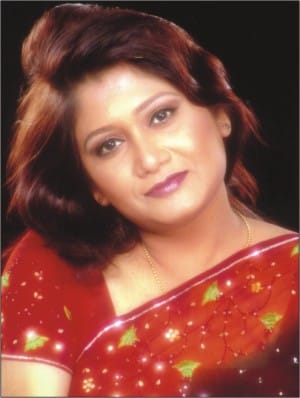<i>Carrying on a musical legacy</i>

My father tutored me in his own distinctive style from a very young age on the technical aspects of singing. But the essence of my music comes from my mother. She was the first female singer to do playback in a Bangla feature film
The Daily Star recently had a rendezvous with Rumana Islam. The artiste believes the rich artistic legacy she was born to has been her life-long inspiration to sing, making her a regular voice on the radio and TV.
“I started taking taalim from Ustad P.C. Gomez when I was ten, but my parents have always been my primary teachers and inspiration,” says Rumana. Daughter of noted singer-composer-actor-filmmaker Khan Ataur Rahman and Mahbuba Rahman, Rumana says that her parents have always been supportive of her decisions. “Although my father, who was very strict, insisted I get a proper education before anything else. My husband and in-laws too are all very encouraging. My father tutored me in his own distinctive style from a very young age on the technical aspects of singing. But the essence of my music comes from my mother. She was the first female singer to do playback in a Bangla feature film. She wanted me to accomplish what she couldn't. Her unwavering faith guided me through my deepest uncertainties,” says Rumana.
Rumana did her first playback at the age of fourteen for her father's movie Din Jai Kotha Thakey. She sang Maaer moto apon keho nai and Mon maajhi tor boitha nerey for the film. In the 1981 movie Danpeetay Chhelay she sang Hairay amar mon matano desh; Khan Ataur Rahman won a National Award for the composition. She won a BACHSAS Award for best vocalist in 1997 for the song Jodia ar dekha nai hoi from the movie Ekhono Onek Raat.
“I graduated in Architecture from BUET in 1988,” says Rumana, “and run the firm 'Bashatikalpa' with my husband, who is also an architect. There was a time when architecture took most of time and music took a backseat. But you can't suppress what is in your blood.”
So far Rumana has released two solo albums and eight mixed and duet albums. The artiste feels that the nature of her work appeals more to a mature audience.
The singer has been training in classical music under Ustad Anil Kumar Saha for the past ten years. “There is no end to learning, in any chosen field,” she says.
“My parents encouraged me to listen to Bengali, Indian and Western classical music. They believed that the classical form provides the foundation for an art. Now I try to listen to everything, classical as well as contemporary, but what I really prefer are semi-classical and folk songs of Bangladesh. My idols are Lata Mangeshkar and Sabina Yasmeen. And I love some of Samina Chowdhury's songs.
“I'm working on two albums, covers of my father's compositions. The first will be released on the occasion of his birthday in December. This will include some of his most popular songs, and the other album will contain his unpublished and not-so-familiar songs. People have been asking me to do this for a long time, but I haven't felt I was ready until now.
“I've worked with noted music directors like Ahmed Imtiaz Bulbul and Alauddin Ali, and most important of all, my father. I'm aware that to many I'm not instantly recognisable but some of my songs are,” she concludes.

 For all latest news, follow The Daily Star's Google News channel.
For all latest news, follow The Daily Star's Google News channel. 



Comments